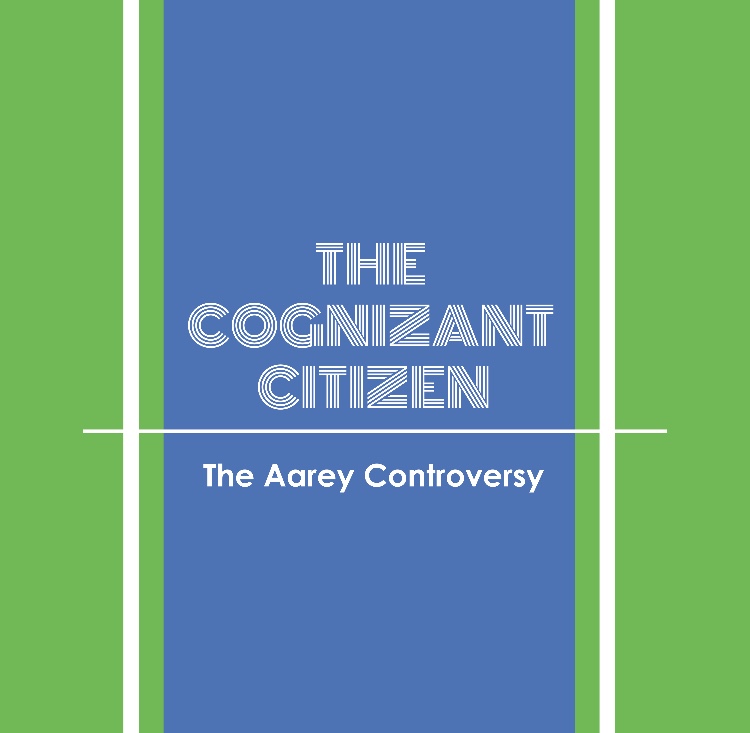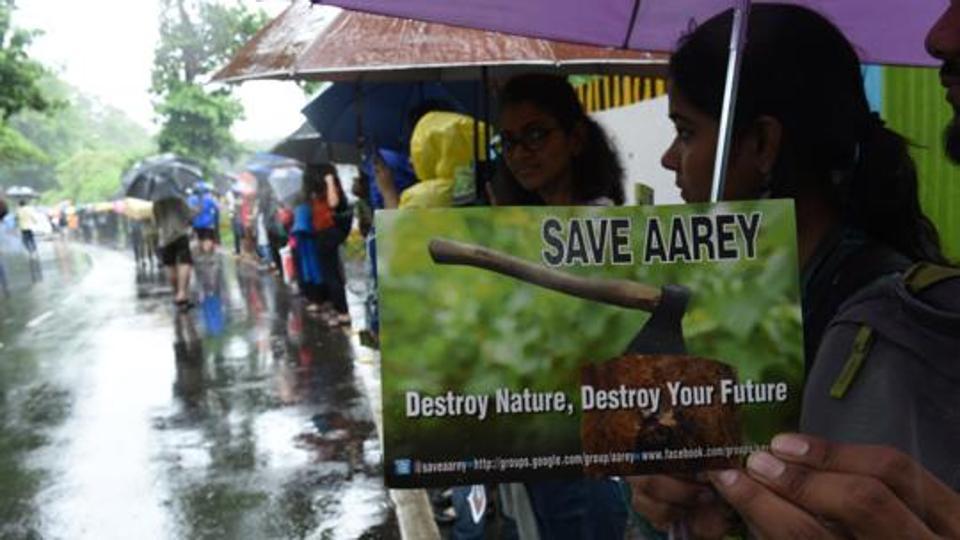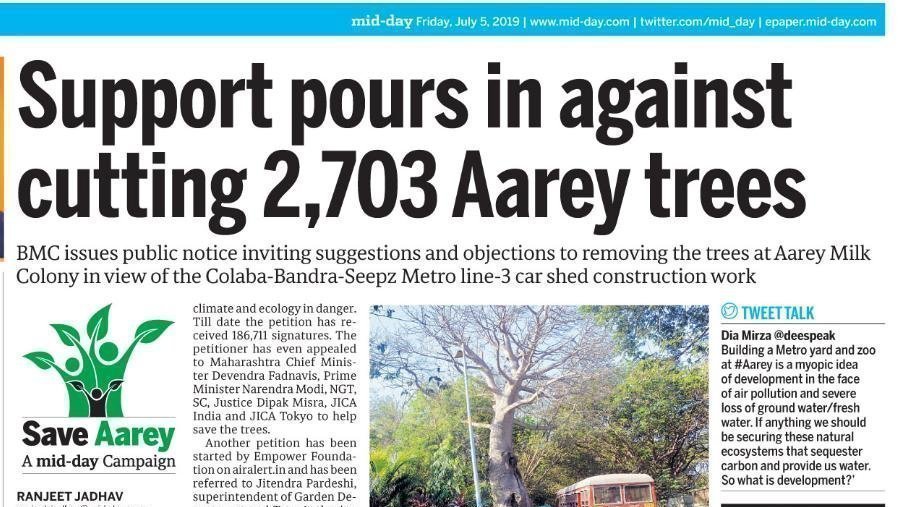
In the concrete jungle of Mumbai, the Aarey forest with five lakh trees, are rightfully the ‘green lungs’ or even the ‘last lungs’ of the overcrowded metropolis. Aarey Milk Colony includes 12 villages: Sai, Gundgav, Film City, Royal Palms, Dindoshi (Eksar Pahad), Aarey, Pahadi Goregaon, Vyraval, Kondivita, Maroshi (Marol), Parjapur, and Paspoli. The colony is spread over 16 square kilometres and is located off the Western Express Highway (WEH). Situated in Goregaon East, the Aarey colony was initially developed as a milk colony in 1949 for dairy development. It was inaugurated in 1951 with a motto of planting for the future by the first Prime Minister of India, Pandit Jawaharlal Nehru. The ‘future’ of the forest now remains uncertain as around 2142 trees have been axed for building a car shed for Mumbai Metro-3. A city that never sleeps might soon become a city that never breathes.
A Brief History
The destruction Aarey faces today, however, is not the first time the forest is being shrunk to pave the way for a modern Mumbai. Bollywood actors may have been taking a stand for Aarey, but let’s not forget in 1989, around 329 acres of the forest was cleared to carve out the very renowned Film City, the base of Bollywood. Ninety-eight acres were given to Force One in 2009. In 2015, 190 acres were cleared for a zoo, and 74 for a car shed. In 2010, Aarey forest had to take a blow once again, to expand the Byculla Zoo. Forty hectares of the forest was cleared to build the extended zoo without enclosures. This was done to provide a night safari to the tourists. A lot more areas were cleared for central and state institutes, including an RBI affiliate.
The Current Situation
Despite widespread protests, on 4th October 2019, the Bombay High Court, in agreement with Brihanmumbai Municipal Corporation allowed the Mumbai Metro Rail Corporation Limited (MMRCL) to axe down 2,646 trees to construct a car shed for Mumbai Metro Line 3 at the Aarey Milk Colony. The cutting down of the trees was opposed by green activists, Adivasis, NGOs and residents.
As the news of the felling of 2141 trees spread, clashes erupted between the police and residents on that night. By the next day, 29 protesters were arrested by the Mumbai Police under Section 144 (unlawful assembly) and Section 332 (voluntarily causing hurt to deter public servant from his duty) of the India Penal Code (IPC). Majority of the arrested were identified as law students. They were sent to judicial custody by the magistrate court as their offences were non-bailable.
A sessions court in Mumbai on Sunday, October 6 granted conditional bail to the accused. Additional sessions court judge H C Shende stated their release on conditions including the production of the personal surety of Rs. 7,000 and assurance that they would not take part in protests. The students, however, are unlikely to leave Thane jail on their own accord as a form of protest.
On Monday, October 9, Mumbai Police spokesperson said, “Today, we have lifted Section 144 in Aarey Colony, and everything is normal in the area.”
A resident, Shyam Bhoir, said, “Everything is now normal in the locality, but police personnel have been deployed in large numbers at the spot where the car shed is going to be built.”
Merits and Demerits
The loss of over 2600 trees in Aarey cannot be compensated with the planting of trees elsewhere. Over 100 Adivasi residents of the Aarey Colony came forward with a candlelight march on October 9 at Naushada Pada. Emotions were laid bare over the grief of the lost trees. They questioned the reason for being jailed for saving the environment.
On the other hand, MMRC has economically done everything it can to ensure minimal damage to the environment and maximum advantage to the well-being of the society. The Car Depot will have a positive impact on commuting in Mumbai. Metro-3 with a 33.5km fully underground corridor will cater to 17 lakh passengers daily. It is expected to have an unfailing frequency of 3-4 minutes, carrying around 2500 passengers at a time. Metro-3 also provides easy transport to suburban areas including Kalbadevi, Goregaon, Worli, International and Domestic Airports. The travel time from previously congested areas of the city is expected to be down by an hour.
Compensating to the loss of the felled trees, MMRC has planted a total of 23,846 trees and distributed 25,000 plants to the project’s neighbourhood. They propose to restore 3,000.
The positive impact on the environment includes a reduction in vehicular trips by 6.65 lakhs per day and a decrease in fuel consumption by 3.45 litres per day. Thus, reducing the annual carbon dioxide emission by 2.61 lakh tons.
Under the Aarey Milk Colony is 1287 hectares of land of which only 30 hectares (2.5%) is required for Car Depot. In the designated 30 Ha, 83% is land without any cover. In Aarey Colony, there are 4.8 lakh trees. Of this, only 2,646 trees will be impacted. As per the Environment Impact Assessment (EIA), study reports show that there is no wildlife in the Car Depot.
As the Car Depot site is situated in the Mithi river catchment area, 75% of the Car Depot will be unpaved and available for water absorption.
Legalities of the Issue
The land of Aarey Milk Colony has been in a legally grey area since as early as 1980. In 1969, it was classified as an ‘unclassed forest’, the administration of the area being handed over to the forest department by the revenue department. On July 22, 1980, the Forest Development Corporation of Maharashtra Limited (FDCM), Nagpur is said to have communicated to the FDCM, Thane, Mumbai, that a part of the land was to be included in the Sanjay Gandhi National Park, then known as the Borivali National Park. Approximately one-fourth of the area (575Ha of 2076Ha) was to be reserved for a ‘recreational zone’. Later that year, on October 10, the land was to be declared as reserved or protected forests, allowing the forest department to have more legislative power over the area. However, no documents are traceable beyond this.
On October 26, 2018, an appeal was submitted to emphasize the status of the Aarey forests. However, the Bombay High Court rejected this plea, at the same time restricting the expansion of the metro project for the time being. The green warriors of the petition then went on to take the case forward with the Supreme Court on April 2019, wanting to safeguard the forest under any circumstance. Upon hearing the appeal, the Mumbai Metro Rail Corporation, hereon referred to as the MMRC, was questioned as to why they could not shift the project to another site. The MMRC stated that they did not find any other place feasible enough. This was enough for the Supreme Court to dismiss the petition.
On July 8 2019, the Brihanmumbai Municipal Corporation (BMC) arranged a public hearing for the citizens to voice their opinions. Over 800 citizens attended this and accompanied by over 50,000 e-mails actively opposing the construction. The order was issued on September 13, 2019, that 2700 trees would be felled for the car shed. It was published on the Municipal Corporation of Greater Mumbai (MCGM)’s website allegedly on October 4, 2019. All petitions to curb the tree-cutting were dismissed by the High Court, due to the precedent set by the October 2018 judgement.
The matter was then taken up at the Supreme Court Level. After the arrest of 29 activists protesting to save the trees, a special hearing was constituted on October 7, 2019, based on a letter by Rishav Ranjan, a law student, registering his concerns as a Public Interest Litigation. This hearing prohibited the cutting of any trees till October 21, when the case will be re-examined yet again. The special bench, consisting of Chief Justice Pradeep Nandrajog and Justice Bharati Dangre, passed the final judgement that there is nothing that can be done to declare Aarey as a protected forest, due to the fact that the tree cover is scantily segregated, therefore not warranting the status, explicitly stating that it was a matter of ‘sink or swim’ for the petitioners. It also illustrates that there is an ambiguity in the definition of the word ‘forest’ in the eyes of the law; therefore, Aarey cannot explicitly be ‘reserved’ or ‘protected’.
The matter remains pending in the Supreme Court and National Green Tribunal, as of October 8, 2019.
Alternatives
In 2015, Chief Minister Devendra Fadnavis, on looking at the backlash the planning of the metro project caused, set up an expert committee to look into the cause. This expert committee consisted of four government servants and two environmentalists – one from the National Environmental Engineering Research Institute (NEERI), and the other from the Indian Institute of Technology (IIT). This committee came up with several options.
Port Trust Land
This land, located on the coast of Colaba, is reserved primarily for harbour facilities. It stretches over around a hundred acres. Tree cover is minimal. At the moment, abandoned warehouses occupy the space.
Mahalaxmi Racecourse
This is a fully functioning racecourse, with several restaurants and recreational activities that are sustained within it. It also contains a grade three heritage structure, a grandstand for spectators. The open land next to it is allegedly available, as the lease for horse racing at the racecourse has expired, and the area lapses back to the government.
Kalina University
Twenty-five hectares of land allotted to the university campus in Kalina, Santacruz, is lying unused. At present, it is encroached upon by slum dwellers with vested interests. The property available was cited as insufficient.
Kanjurmarg
Situated 12 kilometres away from Aarey, these are abandoned salt pans now used as dumping grounds. The area is sufficient to accommodate the metro project plans, and conveniently located as well. However, it is tied up in litigation and therefore, must be legally clear before any action is taken. Appeals remain pending in court.
Out of all these, Kanjurmarg was declared as the most feasible option to shift the project. In October 2015, the state announced that the metro car shed project should be changed here, with only a small stabling unit at Aarey, should the land at Kanjurmarg be made available within three months. Any construction at Aarey would have to be done keeping in mind the environmental impact.
Various Reactions
Shiv Sena president Uddhav Thackeray’s son Aaditya Thackeray slammed the Mumbai metro for axing the trees in Aarey Colony just hours after the Bombay HC’s decision to not quash the BMC tree authority’s decision, allowing felling of over 2,600 trees. Requesting Chief Minister Devendra Fadnavis to look into the matter, Aaditya Thackeray said it was a matter of “shame” if protesters were being arrested and filed cases against.
The issue has taken a political hue in the run-up to assembly polls, with the Opposition parties blaming ruling Bharatiya Janata Party (BJP) and the Shiv Sena for their “failure” in saving trees.
Senior Congress leader and former Mumbai Congress chief Sanjay Nirupam, who went to protest against the felling of trees in Aarey Colony, condemned the BMC tree authority’s decision to cut trees at night. He also opposed the arrest of activists.
Sanjay Nirupam said the Shiv Sena was adopting “double standards”, as it condemned tree felling but continues to support the BJP-led government. Congress’s Milind Deora called the tree cutting decision akin to “stabbing yourself in the lungs” and said the “brutal” felling of trees was a setback for Mumbai. Taking to Twitter, Milind Deora said, “It’s like repeatedly stabbing yourself in the lungs. When cities destroy coastlines and green cover, they are advancing the doomsday clock.”
An issue in Mumbai wouldn’t be complete in its opinions if the who’s who of the film industry did not pass their comments. Amitabh Bachchan tweeted ‘Friend of mine had a medical emergency, decided to take METRO instead of his car…came back very impressed..said was faster, convenient and most efficient…Solution for Pollution. Grow more trees. I did in my garden… have you.’
Amid strong opposition from green activists, Union Environment Minister Prakash Javadekar cited a Bombay High Court order to defend the Mumbai Metro Corporation’s move to fell trees in Aarey Colony, saying it was “not a forest”. “The high court has decided and ruled yesterday that it is not a forest,” Javadekar told reporters here. “You can’t fell anything that is a forest,” he said.
The Way Forward
Undoubtedly, the Aaarey issue has raised one fundamental question, ‘At a time when the nation is going full steam ahead with infrastructural projects, can the nation afford to listen to a billion voices every time the government wishes to do something?’ Should the government let a microscopic minority with a myopic view hinder the progress of a development project which will provide a greener alternative to traffic congestion and curb greenhouse emissions? Nobody wants to see the trees cut, but it is a necessary compromise. Aarey is not the only land going into this project, but these are sacrifices required to ensure passenger safety.
In the pitch of the dark, at 2:00 am, the BMC bulldozed its way through the Aarey Milk colony, axed over 2,000 trees in one blow and took liberal Mumbai by surprise.
The Maharashtra Government, in the Supreme Court, has said that those trees which need to be cut, have been cut. This effectively leaves little scope for debate or protests.
The Metro Shed will be built.
Written by Vaishnavi Karkare, Mahia DeSylva, Aakanksha Mantri and Sunay Mehta for MTTN
Featured graphic by Sayantan Kamarkar
Image Courtesy: Hindustan Times, Economic Times, Sabrang India



Leave a Reply
You must be logged in to post a comment.